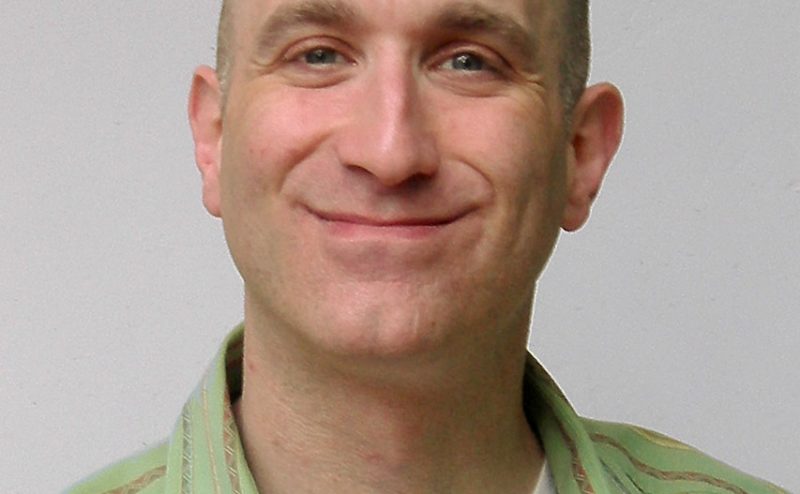
Interviews | Screenplay Doctor | Television
Jeff Greenstein: Stories from TV’s Front Line
Written by Susan Kouguell | Posted by: NewEnglandFilm.com
As the credits roll on some of the most critically acclaimed and groundbreaking television shows, including Friends, Will and Grace, Desperate Housewives, and Parenthood — writer, producer, showrunner, and Emmy award winner Jeff Greenstein’s name is seen prominently.
In his own words, here’s Jeff’s biographical background: “Jeff Greenstein grew up in Atlanta, Georgia and attended Tufts University in Boston, where he started as a computer science major and careened through the art history department, and ended up with a degree in film and dance. This proved the ideal prelude to a glorious career in television comedy.” His first job was on HBO’s Dream On, where he stayed for five seasons, rising from staff writer to showrunner and garnering several industry awards, including the coveted and sadly defunct CableACE. He then signed on for the first year of NBC’s Friends, earning Emmy nominations as both a producer of the series and as co-writer of the show’s first Thanksgiving episode. That same year he co-created Fox’s Partners, starring Jon Cryer and Tate Donovan, which won plenty of critical plaudits but, alas, no second season.
After that, Jeff joined the staff of NBC’s Will & Grace early in its inaugural year. He spent six years as a senior writer and Seasons 5 and 6 as showrunner, picking up an Emmy for Best Comedy Series, six nominations, and a writing nomination — the only one in the show’s history — for the one-hour flashback episode “Lows in the Mid-Eighties.” After leaving Will & Grace, he joined the staff of ABC’s Desperate Housewives for its third season and was part of the team credited with the show’s creative resurgence. Jeff stayed with the series for three years, decamped for a year to launch NBC’s acclaimed drama Parenthood, then rejoined Housewives in Season 7 as writer, executive producer and director. Making his debut with the Halloween show, he helmed three episodes over the course of the final two seasons, most notably one which saw the shocking death of series regular Mike Delfino.
More recently, Jeff directed and executive produced the web sitcom Husbands, co-created by Jane Espenson (Buffy, Battlestar Galactica, Game of Thrones), which earned a rave review in the print edition of The New Yorker and was voted TVLine’s Best Web Series of 2011. The star-studded second season premiered in mid-August, racking up over 100,000 views in its first month and earning praise from Time magazine, Entertainment Weekly and The Atlantic, and the third season is due later this summer. Jeff also recently journeyed to London to write and direct the season finale of Way to Go, a dark comedy about three slacker friends who start a home assisted-suicide business. Starring Blake Harrison (The Inbetweeners) and produced by Jon Plowman (Absolutely Fabulous, The Office), the series premiered on BBC3 in January of 2013. Jeff currently has pilots in development at both Showtime and HBO, but in spite of that is sleeping surprisingly well.
Susan Kouguell: You took a very traditional path to entering Hollywood, stating, ‘I started out at Tufts as a computer science major, careened through the art history department, and ended up with a degree in film and dance. This is now the recommended path if one wishes to pursue a rewarding career in television comedy.’ What path do you recommend for others wanting to break in to the industry?
Jeff Greenstein: I know my path sounds utterly absurd, but I was only half kidding: if you want to do what I do, which is create and run and sometimes direct television shows (or movies, for that matter), there’s no better preparation than the classic liberal-arts education. Become a bit of an expert in everything; sample every dish at the smorgasbord; be a dilettante in the best sense of the word. And I don’t just mean those disciplines related to filmmaking: stagecraft, art direction, editing and the like. I mean Elvis and old cars and woodworking and discus-throwing and lesbian poetry and whatever other obsessions you care to indulge. Get used to creating a world instead of having a world handed to you. Because that is what I really do.
SK: How did you get your first writing gig? Describe what this experience was like for you and how it led you on the path to success.
Greenstein: I’m going to skip the freelance episodes of The Charmings and Mr. Belvedere and Charles in Charge, a.k.a. my juvenalia. My first real writing job was on HBO’s Dream On. My then-partner Jeff Strauss and I lucked into that gig thanks to a spec Murphy Brown which was not only pretty funny, but also exposed more of our inner lives than anything we had written previously. Marta Kauffman and David Crane, the creators of Dream On, must have thought we were entertaining, because — as became apparent the first time we found ourselves in a writers’ room — we knew virtually nothing about screenwriting. Jeff and I had to be taught the rudiments of story structure, character development, everything. I remember saying to David at one point, ‘Why does this scene have to have so much conflict?’ That’s how much of a neophyte I was. So I had a lot to learn, and I learned a lot.
The other good thing about Dream On was the mandate from HBO: to do a show you could never do on a broadcast network. This meant not only nudity and profanity and adult situations, it also meant a defiantly non-network approach to storytelling. If it feels predictable or obvious or TV-like, go the other way. This lesson, inculcated early in my writing career, has served me well to this day.
SK: Paraphrasing Mel Brooks in the recent American Masters documentary Make a Noise, ‘I write comedy for me and I see whether others join in.’ How do you approach writing comedy?
Greenstein: I agree with St. Mel in that I only write for myself — I never, ever think of the audience. I’m only interested in what I find compelling, emotionally satisfying and funny. I write the show I would want to watch. As for comedy: everyone has their own comedic axe. I have belatedly learned that mine is smart people with foolish hearts. Good luck finding your own.
SK: What are the new trends in sitcoms?
Greenstein: To be honest, the trends are in directions I find discouraging. I feel voiceover is a plague. I feel documentary style is played out. And more than anything, although I loved the UK edition of The Office, I’m tired of cringing. I yearn for actual laughs.
SK: Take the reader through the steps of getting a television show off the ground. Step 1: Come up with a brilliant idea, and then…?
Greenstein:…Sell it. And to do that, I always begin with two questions: How does it reflect something emergent in the culture, and how am I uniquely qualified to write it? If you can answer these questions, you can sell a show anywhere, because you’re telling the executives not only why people are going to want to watch it, but also why you’re the one guy or gal who can execute it.
Having sold the show, you have to write the pilot, which is pain, you already knew that. Then there’s casting, the Mystery Black Box of the process and the part that terrifies me the most. Then you rehearse and rewrite and rehearse and rewrite and shoot and edit and deliver the show and pray for the network to pick it up. And they do! So now you assemble a writing staff and map out the season and use all the big brains at your disposal to make it the best thing ever.
SK: As a showrunner, it means one literally runs the television show. Describe your experiences (both positive and negative) in this role.
Greenstein: Look, it’s a fantastic job. I love it. You get to collaborate with great people in a variety of disciplines who are working at the top of their game. And in the case of Will & Grace — probably the best showrunning experience I’ll ever have — you’re also moving the culture. Not to sound too gross about it, but I think that show changed attitudes about gays and lesbians and, in the process, changed peoples’ lives. So you’re collaborating with brilliant people, making lots of money and changing the world — what’s wrong with that?
The bad part is fear. My negative experiences (and I’ve had mercifully few) have come when my collaborators — and in this case, they’re often network executives — are scared to try something new, so they try to file the edges off. Or they want the show to resemble something that’s already working, because that’s comforting, but then all they’ve done is knock off somebody else’s success. I cannot flourish in an atmosphere of fear. The best work comes from a feeling of freedom and limitless possibility.
SK: As students, you and I were both inspired by Yvonne Rainer’s films. What other writers and filmmakers inspired or continue to inspire you?
Greenstein: My Holy Trinity is Charles Schulz, Tom Lehrer and Woody Allen. Their work is what made me want to write comedy. As for filmmakers, the films of Antonioni, Fellini and Godard quite literally changed my life. Especially Antonioni. There is a Blow-Up poster over my writing desk as I type these words.
SK: What are your favorite television shows (sitcoms and dramas, on cable and network) past and present, and why?
Greenstein: Past: M*A*S*H, The Mary Tyler Moore Show, Maude, Yes Minister, The State, The Thick of It, Peep Show, Battlestar Galactica and The Wire (except the final season). In the present, I enjoy Game of Thrones and Veep and eagerly await the return of Newsroom, Breaking Bad and Fresh Meat. I’m not sure what these have in common. I guess I like being taken places I’ve never been before, and I like characters with a strong point of view. I also like to be surprised to the point of OH MY GOD I CAN’T BELIEVE SHE DID THAT.
SK: Maureen Dowd in the May 21, 2013 New York Times article ‘Serving Up Schlock’ writes: ‘Networks still prefer to play it safe with likable characters, not darker ones like Tony Soprano, Walter White, Don Draper, Nicholas Brody and face-chewing zombies.’ She continues… ‘[Rod] Serling once complained that TV drama ‘must walk tiptoe and in agony lest it offend some cereal buyer from a given state below the Mason-Dixon.’ But the networks of the 21st century don’t seem hungry to push the envelope, despite their ever-shrinking audiences.’ What is your reaction to this? Do you feel that network executives are playing it too safe?
Greenstein: See above. Broadcast TV is in its death throes, wracked by fear and anxiety and a shrinking, aging audience. Meanwhile cable provides not only the best TV, it kicks the ass of the movies as well. Show me a film comedy as good as The Thick of It or a film drama as good as Breaking Bad. There aren’t any.
This situation is not going to change, however. In a post-DVR, post-internet world, the economics of broadcast TV don’t make sense anymore. I feel fortunate to have worked on three monster hit shows — Friends, Will & Grace and Desperate Housewives — because we shall not see their like again.
SK: Any final words of wisdom you would like to share?
Greenstein: This is a tough and highly competitive business which is far from a meritocracy. However, should you feel the barriers to entry are too high, remember that you have an HD camera in your back pocket right now.
Award-winning screenwriter and filmmaker Susan Kouguell teaches screenwriting and film at Tufts University, and is chairperson of Su-City Pictures East, LLC, a motion picture consulting company founded in 1990 where she works with over 1,000 writers, filmmakers, and film executives worldwide ( www.su-city-pictures.com; su-city-pictures.blogspot.com). Susan wrote The Savvy Screenwriter: How to Sell Your Screenplay (and Yourself) Without Selling Out! (St. Martin’s Griffin) and SAVVY CHARACTERS SELL SCREENPLAYS! A comprehensive guide to crafting winning characters with film analyses and screenwriting exercises, which is available at $1.00 off by clicking on www.createspace.com/3558862 and using DISCOUNT CODE: G22GAZPD. To order the Kindle version: http://www.amazon.com/dp/B009SB8Z7M (discount code does not apply). To read an excerpt go to: https://www.createspace.com/Preview/1089452. Follow Susan at Su-City Pictures, LLC Facebook fan page and SKouguell Twitter page to receive more Savvy Tips.
Award-winning screenwriter and filmmaker Susan Kouguell teaches screenwriting and film at Tufts University, and is chairperson of Su-City Pictures East, LLC, a motion picture consulting company founded in 1990 where she works with over 1,000 writers, filmmakers, and film executives worldwide ( www.su-city-pictures.com; su-city-pictures.blogspot.com). Susan wrote The Savvy Screenwriter: How to Sell Your Screenplay (and Yourself) Without Selling Out! (St. Martin’s Griffin) and SAVVY CHARACTERS SELL SCREENPLAYS! A comprehensive guide to crafting winning characters with film analyses and screenwriting exercises, which is available at $1.00 off by clicking on www.createspace.com/3558862 and using DISCOUNT CODE: G22GAZPD. To order the Kindle version: http://www.amazon.com/dp/B009SB8Z7M (discount code does not apply). To read an excerpt go to: https://www.createspace.com/Preview/1089452. Follow Susan at Su-City Pictures, LLC Facebook fan page and SKouguell Twitter page to receive more Savvy Tips.










